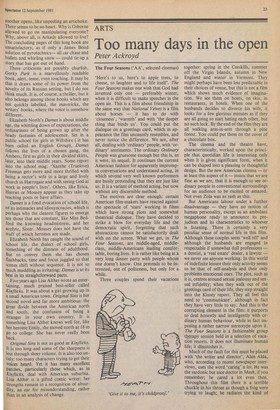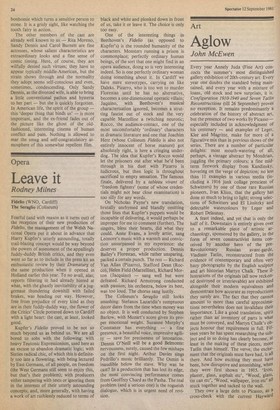ARTS
Too many days in the open
Peter Ackroyd
The Four Seasons ('AA', selected cinemas) 'Here's to us, here's to apple trees, to cheese, to laughter and to life itself'. The Four Seasons makes one wish that God had invented only one — preferably winter, when it is difficult to make speeches in the open air. This is a film about friendship in the same way that National Velvet is a film about horses — it has to do with 'closeness', 'warmth' and with 'the deeper thing that binds us'. You could put the dialogue on a greetings card, which in appearance the film uncannily resembles, and never notice the difference. We are, after all, dealing with 'ordinary' people, with 'ordinary' sentiments. The ordinary Ordinary People was gruesome enough but this is, as it were, its sequel. It continues the current American fashion for apparently impromptu conversations and understated acting, in which several very well known performers are busily pretending that they are just like us. It is a variant of method acting, but now without any discernible method.
The motives are clear enough: certain American film-makers have reacted against the spectacle of 'stars' working in films which have strong plots and somewhat theatrical dialogue. They have decided to strike a blow for everyday life and the democratic spirit, forgetting that such abstractions cannot be satisfactorily dealt with on the screen. What we get, in The Four Seasons, are middle-aged, middleclass, middle-Americans leading comfortable, boring lives. It is rather like being at a very long dinner party with people whom one doesn't know. One pretends to be interested, out of politeness, but only for a while.
Three couples spend their vacations together: spring in the Catskills, summer off the Virgin Islands, autumn in New England and winter in Vermont. They might perhaps have been less predictable in their choices of venue, but this is not a film which shows much evidence of imagination. We see them on boats, on skis, in restaurants, in hotels. When one of the husbands decides to divorce his wife, it looks for a few glorious minutes as if they are all going to start hating each other, but no such luck. By the end of the film they are all walking arm-in-arm through a pine forest. You could put them on the cover of a chocolate box.
The cinema and the theatre have, characteristically, worked upon the principle that quotidian life is interesting only when it is given significant form, when it can be shaped into a pleasing or thoughtful design. But the new American cinema — or at least this aspect of it — insists that we are fine as we are, that it is enough to see ordinary people in conventional surroundings for an audience to be excited or amazed. Not even Zola was as rash as this.
But Americans labour under a further disadvantage — they have no notion of human personality, except as an ambulant megaphone ready to announce its prejudices and its characteristics to whoever is listening. There is certainly a very peculiar sense of normal life in this film. Although these couples seem 'well ofr and although the husbands are engaged in respectable if somewhat dull professions — a dentist, a 'real estate' dealer, a lawyer — we never see anyone working. In this world of indefinite leisure their only activity seems to be that of self-analysis and their only problems emotional ones. The plot, such as it is, centres around sexual jealousy and sexual infidelity; when they walk out of the greetings card of their life, they step straight into the Kinsey report. They all feel this need to 'communicate', although in fact they have very little to say. And this is the corrupting element in the film: it purports to deal honestly and intelligently with ordinary human behaviour, while in fact imposing a rather narrow stereotype upon it. The Four Seasons is a fashionable group therapy session held in a selection of vacation resorts. It does not illuminate human life; it diminishes it.
Much of the fault for this must be placed with 'the writer and director', Alan Alda, who, according to recent newspaper interviews, uses the word 'caring' a lot. He was the sardonic but nice doctor in Mash, if you remember; he cared a lot even then. Throughout this film there is a terrible chuckle in his throat as though a frog were trying to laugh; he radiates the kind of bonhomie which turns a sensitive person to stone. It is a grisly sight, like watching the tooth fairy in action.
The other members of the cast are already well known to us — Rita Moreno, Sandy Dennis and Carol Burnett are fine actresses, whose salient characteristics are extraordinary looks and a fine sense of comic timing. Here, of course, they are wilfully denied such virtues; they have to appear typically middle-American, but the strain shows through and the normality they adopt seems self-conscious and even, sometimes, condescending. Only Sandy Dennis, as the divorced wife, is able to bring a little conventional pathos and hysteria to her part — but she is quickly forgotten. In American life, the spirit of the group — this 'deeper thing that binds us' — is more important, and the ex-friend fades out of the picture like the ghost of the oldfashioned, interesting cinema of human conflict and pain. Nothing is allowed to mar the smug and self-congratulatory atmosphere of this somewhat repellent film.

































 Previous page
Previous page